
Section 7. International water organizations and initiatives
7.1. Asia Water Council
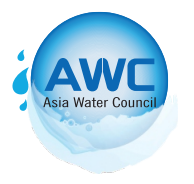 The Asia Water Council (AWC) is a global network focused in providing tangible solutions on Asian water challenges and facilitating multilateral discussions among stakeholders. It was established at the initiative of South Korea during the World Water Forum in March 2015. AWC is composed of 152 members from 24 countries. The AWC action tools include the application of high-tech tools in all areas of water management and nature conservation through IWRM, the reduction of risks through better water security, especially as concerns prevention of floods and droughts. AWC is the main organizer and sponsor of the Asia International Water Week (AIWW).
The Asia Water Council (AWC) is a global network focused in providing tangible solutions on Asian water challenges and facilitating multilateral discussions among stakeholders. It was established at the initiative of South Korea during the World Water Forum in March 2015. AWC is composed of 152 members from 24 countries. The AWC action tools include the application of high-tech tools in all areas of water management and nature conservation through IWRM, the reduction of risks through better water security, especially as concerns prevention of floods and droughts. AWC is the main organizer and sponsor of the Asia International Water Week (AIWW).
Activities in 2023
Asia International Water Week. The 3rd AIWW will be jointly hosted by AWC and the MWR of China and organized by the China Institute of Water Resources and Hydropower Research, and is set to take place from September 24 to 28, 2024 in Beijing, China. Under the theme "Enhancing our future water security," the 3rd AIWW consists of three pillars: Asian to World Statement, Asian Water Issues, and Water Project Business Forum. Focusing on the major challenges related to water in Asia, six sub-themes were also proposed for the 3rd AIWW: (1) Water Disasters and Climate Change; (2) Water for Shared Prosperity; (3) Water for Food Security; (4) Water and Watershed Ecosystems; (5) Sustainable Hydropower Development; (6) AI for Water Management. All the sub-themes are interconnected, together forming the water cycles in both the nature and human society. The 3rd AIWW Kick-off Meeting was successfully held in Hwaseong, Korea (July 7). During the Kick-off Meeting, IWHR introduced the overall progress of the preparations for the 3rd AIWW, organized group discussions on Asian water issues and reported on the drafting of Asian to World Statement.
Events. The following events took place in the course of 2023: AWC 17th Board of Council meeting. The meeting reported on the new members, financial operations, member activities, 2023 water projects, and preparations for the 3rd AIWW, 2023-2026 BoC election, and other related matters (hybrid format, July 5); 4th AWC General Assembly, with more than 200 representatives from Asian nations, including government officials and academics, as well as international organizations such as OECD, GCF and GWP. The election committee was established during the general meeting, and a new Board (2023-2026) with 29 members was elected after on-site voting (Hwaseong, Korea, July 6); 18th Board of Council meeting, on which, Yun Seog-dae, CEO of K-Water was elected as the President of AWC (hybrid format, July 7); 19th Board of Council meeting, where preparation for the 3rd AIWW was updated, the venue for the 4th AIWW was selected, and the participation plan for 10th WWF was discussed (Manila, Philippines, November 6).
Source: Asia Water Council
7.2. Geneva Water Hub
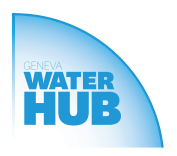 The Geneva Water Hub is a Centre of the University of Geneva, co-financed by joint project of the Swiss Confederation (Swiss Agency for Development and Cooperation, SDC, Global Program Water Division) and the University of Geneva. The Geneva Water Hub was established in 2014 to help prevent water conflicts at an early stage and to promote water as an instrument of peace and cooperation. The Platform for International Water Law (PIWL) was established by some members of the Department of Public International Law and International Organization of the Faculty of Law of the University of Geneva in 2009. Later, it became a part of the Geneva Water Hub. The Geneva Water Hub serves as the Secretariat of the Global High-Level Panel on Water and Peace.
The Geneva Water Hub is a Centre of the University of Geneva, co-financed by joint project of the Swiss Confederation (Swiss Agency for Development and Cooperation, SDC, Global Program Water Division) and the University of Geneva. The Geneva Water Hub was established in 2014 to help prevent water conflicts at an early stage and to promote water as an instrument of peace and cooperation. The Platform for International Water Law (PIWL) was established by some members of the Department of Public International Law and International Organization of the Faculty of Law of the University of Geneva in 2009. Later, it became a part of the Geneva Water Hub. The Geneva Water Hub serves as the Secretariat of the Global High-Level Panel on Water and Peace.
Activities in 2023
Water for peace. In 2023, the Geneva Water Hub has continued to develop and leverage strategic partnerships to promote water for peace at various fora, including the First Africa 2050 Forum and the SIWI World Water Week. The GWH hosted two side events and contributed to 15 side events at the UN Water Conference, and to five events during the New York Water Week. The GWH systematically included the voice of young experts in its events. The inputs of the GWH to the UN Water Conference were appreciated and as a result the Hub was invited by the Netherlands to take part to the high-level panel on the follow-up of the conference during the Stockholm water week.
The GWH manages the secretariat of the Group of Friends on Water and Peace. Its 18th meeting focused on "Women, Peace, Water: The Role of Women in Water Diplomacy". The discussion was extremely active, with a good mix of political and expert inputs. About 40 missions participated in the events (Geneva, October 16).
Water and armed conflict. The GWH pursued its work on the protection of freshwater and water infrastructure, positioning itself as a leader in this domain, both for content and for reputation. The GWH published a report on the "National legal frameworks related to the protection of water during armed conflicts", a follow-up to the Geneva Principles on the Protection of Water Infrastructure. It also contributed to the ILC PERAC Principles for the Protection of the Environment in Armed Conflict, a document of strategic importance for the advocacy of the protection of water resources. The GWH also contributed to several high-level discussions and events (New York and European Humanitarian forum, Brussels, March 20-21) to further promote the legal instruments for the protection of water as well as highlighting the consequences of reverberating effects for the civilian populations.
Preparation of big events. In the second half of the year, the GWH was mainly involved in the preparation the upcoming big events in 2024, such as the 10th World Water Forum, the Stockholm World Water Week and the Summit for the Future, as 2024 will be the year of Water and Peace. The GWH participated actively in the UN-Water Task force meetings in preparation of 2024's year of Water and Peace and was closely involved in the organization of the different events planned for the World Water Day. GWH also provided written comments to the UN World Water Development Report 2024 "Water for prosperity and peace" and to the UN System-wide Strategy for Water and Sanitation.
Finally, in 2023, the GWH was accepted by UN Water as "partner". The GWH co-organized two events during the Geneva Peace Week (October 30 - November 3) on key aspects of water and peace. One event focused on the presentation of the report on Water and Peace from the Special Rapporteur on Water and Sanitation ("Water as an argument for peace, twinning and cooperation", to which the GWH contributed substantially). The second focused on the political aspects of water when dealing with climate change.
Transboundary cooperation. The GWH adhered to the Transboundary water cooperation coalition and is involved in the institutionalisation process of the coalition. The GWH increased its presence in the security fora: it was present at the Bled Strategic Forum (August 28-29), at the Prague Forum on the Economic and Environmental Dimension of the OSCE (September 14-15), at the Munich Security Conference (February 17-19) and is pursuing discussions with the Sanremo Institute of International Law.
Source: Geneva Water Hub
7.3. Global Water Partnership
 The Global Water Partnership (GWP) is a global network of action including over 3,000 partners in 180 countries. The network has 77 accredited Country Water Partnerships (CWPs) and 13 Regional Water Partnerships (RWPs), with the mission to advance governance and management of water resources for sustainable and equitable development.
The Global Water Partnership (GWP) is a global network of action including over 3,000 partners in 180 countries. The network has 77 accredited Country Water Partnerships (CWPs) and 13 Regional Water Partnerships (RWPs), with the mission to advance governance and management of water resources for sustainable and equitable development.
Activities in 2023
2023 was the first year of the 2023-2025 Work Programme, which provided renewed pointers to guide the implementation of the second half of the GWP 2020-2025 Strategy.
Transboundary water cooperation. GWP’s transboundary water cooperation anchor area aims to improve cooperation over transboundary waters globally, contributing to water security and peace. The programme is loosely structured around four key components: 1) Transboundary water management knowledge and learning; 2) Regional dialogues on transboundary waters; 3) Cooperation for the management of transboundary water bodies; and 4) The transboundary aspects of SDG target 6.5 on IWRM. Progress achieved in 2023 across each of these four components is described below.
Transboundary water management knowledge and learning. GWP has a well-established capacity building programme in Africa, Latin America and Asia developed in collaboration with a wide range of global, regional and national level partners and targeted at practitioners and legislators involved in transboundary water management. At global level, GWP continues to run the GEF IW:LEARN Governance for Transboundary Freshwater Security MOOC to which over 3800 learners from 167 countries are registered. In addition, the Transboundary Water Knowledge Exchange Hub is providing a platform for peer-to-peer exchange on the IWRM Action Hub. GWP also co-organized the Global International Water Law training convened by UNECE and hosted by Hungary, which trained 90 practitioners from various transboundary basins around the world.
Regional dialogues on transboundary waters. Regional dialogues constitute a series of events focusing on policy and technical instruments to address transboundary water management. By focusing on solutions, these dialogues can assist in identifying entry points for cooperation at the level of specific basins. Examples of GWP’s work on this component in 2023 include: (1) validation by the Minister Council of the Central American Commission of Environment and Development (CCAD) of the Regional Guidelines on the Principles of Cooperation for Transboundary Water Management in the Central American Integration System (SICA) Region; (2) launch of the new publication Multistakeholder Regional Dialogues: Pathways for Advancing Transboundary Water Cooperation, which provides reflections on key factors that enable multi-stakeholder dialogues to positively influence transboundary cooperation by diving into three concrete examples in South East Europe, South Asia and Southern Africa. An interactive online learning event was organized inviting key actors engaged in fostering successful dialogues.
Cooperation for the management of transboundary water bodies. GWP supported the establishment of the Buzi, Pungwe, and Save Watercourse Commission (BUPUSACOM) in Mozambique and Zimbabwe. A new project was approved by the GEF Council focused on transboundary cooperation in the Drin Basin. With a duration of 5 years and a budget of $7.1 million, the project will support the implementation of the Drin Strategic Action Programme and enable countries coordinating action at the Drin Basin level. An International Agreement for the management of the Drin Basin is one of the processes that will be facilitated in the context of the project.
GWP supported the process of Togo’s adherence to the 1992 UNECE Convention on the Protection and Use of Transboundary Watercourses and International Lakes and collaborated with the Commission of the West African Economic and Monetary Union (UEMOA) and UNECE to promote countries’ accession to the Conventions on shared surface and groundwater in the UEMOA region.
SDG 6.5 targets on transboundary waters. In 2023, 5 countries requested GWP’s support to complete the monitoring of SDG 6.5.2 (Armenia, Cameroon, Central African Republic, Malaysia and Panama), which focuses on the proportion of transboundary basin area with an operational arrangement for water cooperation.
Central Asia and the Caucasus. In 2023, GWP supported organization of stakeholder consultation meetings on monitoring and reporting of SDG Indicator 6.5.1, the degree of implementation of Integrated Water Resources Management, in the countries of Caucasus (Armenia, Azerbaijan, and Georgia). Capacities for drought policy preparation were strengthened in Armenia as part of the GWP-implemented project "Knowledge transfer on drought issues due to climate change for Armenia".
As to Central Asia, workshops to discuss the progress and reporting on the implementation of IWRM were organized in Kazakhstan and in Uzbekistan. In Turkmenistan, the first round of stakeholder consultations on the progress of implementing SDG 6.5.1 was co-organized by the Regional Water Partnership for Central Asia and Caucasus (GWP CACENA), which also supported a workshop titled "Gender and Water Resources in the Process of Adaptation to Climate Change" (December 7).декабря).
The process of accreditation re-check was initiated by GWP Kazakhstan and Tajikistan. The purpose of this exercise is to verify that CWPs continue to fulfill the GWP Conditions of Accreditation, identify areas that require strengthening and related actions that contribute to energize the platform of partners.
Source: GWP
7.4. International Commission on Irrigation and Drainage
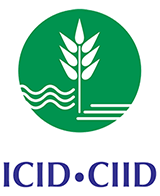 The International Commission on Irrigation and Drainage (ICID) was established in 1950 as a scientific and technical organization with a view to develop scientific technologies in engineering, agriculture, irrigation and drainage, economy, ecology, and social sciences to increase food production, protect environment, improve water quality, improve land productivity, and manage floods and disasters. Kazakhstan, Tajikistan, and Uzbekistan are the members of ICID.
The International Commission on Irrigation and Drainage (ICID) was established in 1950 as a scientific and technical organization with a view to develop scientific technologies in engineering, agriculture, irrigation and drainage, economy, ecology, and social sciences to increase food production, protect environment, improve water quality, improve land productivity, and manage floods and disasters. Kazakhstan, Tajikistan, and Uzbekistan are the members of ICID.
Activities in 2023
In 2023, the major event was the 25th International Congress on Irrigation and Drainage and the 74th International Executive Council meeting organized by the Indian National Committee of ICID (INCID) on the theme ‘Tackling Water Scarcity in Agriculture’ (Vishakhapatnam (Vizag), Andhra Pradesh, India, November 1-8).
The prestigious ICID Congress brought together a global congregation of around 1300 experts, researchers, and professionals from 41 countries. The three-day Congress was comprised of two plenary sessions, 18 thematic sessions and a number of side events to answer the two key questions: (Question 64): What alternative water resources could be tapped for irrigated agriculture? and (Question 65): Which on-farm techniques can increase water productivity?
The Opening Plenary presented ICID annual awards and recognitions. Total nineteen structures from seven countries have been recognized by ICID as World Heritage Irrigation Structures. Iranian National Committee on Irrigation and Drainage (IRNCID) has won the 7th Best Performing National Committee (BPNC) Award . The Best Paper Award 2023 was presented to Japanese researchers for their outstanding paper entitled "The development of a hybrid model to forecast paddy water temperature as an alert system for high-temperature damage."
During the 74th ICID International Executive Council meeting the new ICID President and three ICID Vice-Presidents were elected for the period 2024-2026: ICID President - Dr. Marco Arcieri (Italy), who replaced the retired Prof. Dr. Ragab Ragab (Great Britain); ICID Vice Presidents - Dr. Fuqiang Tian (China); Dr. Vadim Sokolov (Uzbekistan); Dr. Watchara Suiadee (Thailand).
Other events. The 10th International Micro Irrigation Conference was organized on 25-27 January on the theme ‘Micro-irrigation in the Era of Technology Innovation and Digital Transformation’ (Morocco). The three-day conference which aimed to share experiences of using new technologies and best management practices in drip, micro-sprinkler and other localized irrigation systems was witnessed a large group of eminent international and national experts from 16 countries and local farmers, in the field of the latest development in micro irrigation technology, to enhance the crop production and water management for optimal use in agriculture, technical and sociological interventions for sustainable water, food and agriculture.
In the course of the year, ICID together with partners organized a series of webinars, in particular on: (1) INSPIRE: Performance Assessment Tools in Irrigation and Drainage (February 16); (2) Tsunami / Tidal Wave Protection in Japanese Case (April 19); (3) Empowerment and Capacity Development of Women in Water Resources Management (May 3); (4) 74th ICID and INCID Foundation Day Celebrations on the Theme: Role of Modern Irrigation in Global Food Security (June 26); (5) Towards the Utilization of Agricultural Drainage Benefits for Facing the Future Challenges and Achieving Sustainability (September 29); (6) Adapting Agriculture to Climate Change: Strategies for Resilience and Sustainability (November 22); (7) Role of Women in Water Governance and Management (December 28).
Publications. Irrigation and Drainage Journal (Volume 72); Special publication Historical Water Sustainability.
Source: ICID, IFAS Agency for Implementation of the Aral Sea Basin Projects in Uzbekistan
7.5. International Network of Basin Organizations
 The International Network of Basin Organizations (INBO) was established in 1994 in Aix-les-Bains (France) to promote integrated water resources management at the level of national and transboundary basins of rivers, lakes and groundwater aquifers to link economic growth, social equity, water and environmental protection, and civil society participation. Basin organizations, governmental administrations in charge of water, and bi- and multilateral cooperation organizations are the members of INBO from 90 countries. INBO member organizations belonging to the same geographic region created 8 regional networks of INBO.
The International Network of Basin Organizations (INBO) was established in 1994 in Aix-les-Bains (France) to promote integrated water resources management at the level of national and transboundary basins of rivers, lakes and groundwater aquifers to link economic growth, social equity, water and environmental protection, and civil society participation. Basin organizations, governmental administrations in charge of water, and bi- and multilateral cooperation organizations are the members of INBO from 90 countries. INBO member organizations belonging to the same geographic region created 8 regional networks of INBO.
Activities in 2023
Events. Main international events: (1) 1st kick-off meeting of 10 WWF, where INBO brought its ideas and initiatives, in particular IWRM at the level of basins, as a solution for better water management and supported by the Dakar Action Plan and by the Water & Nature Declaration (Jakarta, Indonesia, February 15-16); (2) UN 2023 Water Conference, where INBO organized and intervened in 13 sessions to promote IWRM to accelerate the implementation of the Sustainable Development Goals (New York, March 22-24); (3) 3rd International Conference on Water and Climate, co-organized with the Kingdom of Morocco and WWC, was focused on basin management as a key to adaptation and achieving the SDGs (Fez, Morocco, July 6-7); (4) XVIIIth IWRA World Water Congress, with 3 special sessions organized by INBO on water information systems, basin water management, and nature-based solutions (Beijing, China, September 11-15); (5) 21st International Conference Europe-INBO for the Implementation of the European Water Directives (Valencia, Spain, October 16-19); (6) United Nation Climate Change conference (COP28), with INBO organizing seven events on water and adaptation to climate change (Dubai, UAE, November 30- December 12).
Webinars: on (1) Improving national river continuity restoration policies for European ecosystem-based river management (June 27); (2) webinar on Policy Gaps (December 14) in partnership with its regional network, Europe-INBO, and the project Water4All.
In the course of 2023, preparations were underway to the INBO World General Assembly, associated with the INBO’s 30th anniversary, to be held in 2024 in Bordeaux, France. The General Assembly will include 9 thematic sessions under the general theme "Water resources and climate change: How can basin management be more resilient?".
Projects. INBO and its Permanent Technical Secretariat have been working since 2016 on the incubation of water and climate projects for Africa, enhancing in particular the interest of IWRM at the level of basins. In 2023, this initiative has evolved into a Water and Climate Project Incubator whose aim is: (1) the detection of new climate change adaptation projects, (2) the incubation of selected projects among the detected ones, through the promotion of the incubator through physical and digital events and communication campaigns.
Publications. INBO Report on UN 2023 Water Conference (published in March); Redaction, in view of their publications at the 10th World Water Forum in Bali, of: - a new methodological guide on the transfer of waste and plastics into aquatic environments to be produced in the collection of "INBO Manuals"; - a special edition of the Water International Journal.
Source: INBO
The Eastern Europe, Caucasus, and Central Asia Network of Water Management Organizations (EECCA NWO)
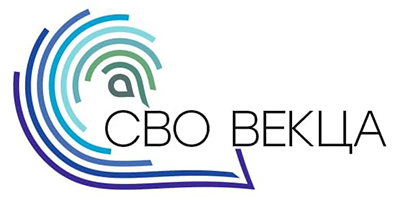 EECCA NWO is one of eight regional networks of INBO. It was established in 2010 to exchange views, experiences, and information on various aspects of water management activity. The Network is administered by SIC ICWC, and Network's activities are coordinated with those of INBO.
EECCA NWO is one of eight regional networks of INBO. It was established in 2010 to exchange views, experiences, and information on various aspects of water management activity. The Network is administered by SIC ICWC, and Network's activities are coordinated with those of INBO.
In 2023, a roundtable in memory of Prof. V.A. Dukhovniy on the theme "Improvement of regional water and energy cooperation in Central Asia" was held under umbrella of EECCA NWO (August 16, online).
Among big events organized by members of the Network were the following: International Scientific-Practical Conference "Current issues of efficient and integrated use of water resources" (Minsk, March 22-24); 5th Central Asian Conference on Climate Change (CACC-2023) (Dushanbe, May 16-17); Bishkek Water Forum (31 May); Conference dedicated to 30th anniversary of IFAS "Central Asia: towards sustainable future through strong regional institution (Dushanbe, June 5-7); International Scientific-Practical Conference "Land reclamation for addressing geo-ecological problems in Eurasia (Moscow, December 13-15).
The information on the activities of the Network and its members is disseminated via the special website as well as the social media Facebook, LinkedIn.
In 2023, the Network members contributed to the 2022 Water Yearbook: Central Asia and around the Globe and the discussion paper "Rethinking Institutional and Financial Mechanisms on Water and Energy Cooperation in Central Asia".
Source: EECCA NWO Secretariat
7.6. International Water Management Institute
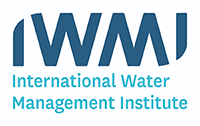 International Water Management Institute (IWMI) is a research-for-development (R4D) organization, with headquarters in Colombo, Sri-Lanka, offices in 13 countries and a global network of scientists operating in more than 30 countries. IWMI is a Research Center of CGIAR, the global research partnership for a food-secure future. IWMI’s Vision reflected in its Strategy 2019-2023 is "a water-secure world". IWMI leads the CGIAR Research Program on Water, Land and Ecosystems.
International Water Management Institute (IWMI) is a research-for-development (R4D) organization, with headquarters in Colombo, Sri-Lanka, offices in 13 countries and a global network of scientists operating in more than 30 countries. IWMI is a Research Center of CGIAR, the global research partnership for a food-secure future. IWMI’s Vision reflected in its Strategy 2019-2023 is "a water-secure world". IWMI leads the CGIAR Research Program on Water, Land and Ecosystems.
Activities in 2023
IWMI continued to implement its strategy 2019-2023, which responds directly to the demand for innovative, scientifically tested water management solutions for sustainable development. Three high-priority water challenges were addressed: food, climate, and growth. The implementation of the strategy was supported by the IWMI’s Gender and Inclusion Strategy 2020-2023.
New projects: (1) Addressing Climate Vulnerability in Nepal through Resilient Inclusive WASH systems (RES-WASH) (2023 – 2024, Department of Foreign Affairs and Trade (DFAT)); (2) Groundwater for Deep Resilience in Africa - Design Phase (2023, South Africa/GEF).
Research projects involving Central Asian countries: (1) Water Efficient Allocation in a Central Asian Transboundary River Basin (2023-2026, Kyrgyz Republic, Uzbekistan/EC); H2020: Hydropower For You (2021-2026, Central Asia/EU); (2) From Fragility to Resilience in Central and West Asia and North Africa (2022-2025, Egypt, Sri Lanka, Uzbekistan/CGIAR Trust Fund); (3) NEXUS Gains: Realizing Multiple Benefis Across Water, Energy, Food and Ecosystems (Forests, Biodiversity) (2022-2024, Ethiopia, India, Nepal, Pakistan, Uzbekistan, South Africa/CGIAR); (4) Improving and Strengthening Water Security and Watershed Management in Central Asia (2022-2023, Central Asia/United States Forest Services); Implementation and conducting of Trainings on water efficiency technologies by cotton production in Uzbekistan (extended to 2023, BMZ); (5) Increasing water use efficiency in the Aral Sea region (extended to 2023, Kazakhstan, Uzbekistan/GIZ).
Awards. IWMI won Award for Digital Transformation from Project Management Institute (PMI) in Sri Lanka in 2023. The award recognized the Earth Observation for Agricultural Risk Management (EO4ARM) application for its contribution to accelerating Sri Lanka’s agricultural digital transformation. The EO4ARM platform helps to build agricultural resilience among smallholder farmers in Sri Lanka by providing a comprehensive range of solutions — including weather forecasts, flood and drought monitoring, crop health status and farm-level updates — to assess climate risks and crop health, and enable timely compensation and mitigation measures.
Publications. (1) IWMI Research Reports 184-188, (2) IWMI Working Papers 205-206, 210, 212, (3) 7 Briefing notes, (4) Water quality in agriculture: risks and risk mitigation.
Source: IWMI
7.7. Stockholm International Water Institute and World Water Week
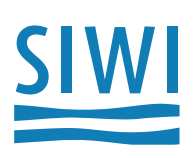 The Stockholm International Water Institute (SIWI) is a Swedish not-for-profit Foundation. The SIWI’s vision is a Water Wise World – a world that recognizes the value of water and ensures that it is inclusively shared and used sustainably, equitably, and efficiently for all. At SIWI, they believe that the best way to tackle water crises and help bring about lasting change – is to strengthen water governance among public and private actors alike. SIWI focuses on priority areas including transboundary water cooperation, international policy, WASH, and water governance and streamlines three cross cutting issues – gender equality, youth empowerment, and human rights-based approaches – throughout all programming. SIWI hosts the world’s premier annual water meeting and water dialogue platform, the World Water Week and awards the prestigious Stockholm Water Prize and the Stockholm Junior Water Prize. As a trusted convener, SIWI is the host and driver of important initiatives such as the UNESCO Category II’s International Centre for Water Cooperation and the Shared Waters Partnership (SWP), hosted by SIWI’s Transboundary Water Cooperation Department.
The Stockholm International Water Institute (SIWI) is a Swedish not-for-profit Foundation. The SIWI’s vision is a Water Wise World – a world that recognizes the value of water and ensures that it is inclusively shared and used sustainably, equitably, and efficiently for all. At SIWI, they believe that the best way to tackle water crises and help bring about lasting change – is to strengthen water governance among public and private actors alike. SIWI focuses on priority areas including transboundary water cooperation, international policy, WASH, and water governance and streamlines three cross cutting issues – gender equality, youth empowerment, and human rights-based approaches – throughout all programming. SIWI hosts the world’s premier annual water meeting and water dialogue platform, the World Water Week and awards the prestigious Stockholm Water Prize and the Stockholm Junior Water Prize. As a trusted convener, SIWI is the host and driver of important initiatives such as the UNESCO Category II’s International Centre for Water Cooperation and the Shared Waters Partnership (SWP), hosted by SIWI’s Transboundary Water Cooperation Department.
World Water Week
World Water Week is the leading annual conference on water, a meeting place for our ever growing and inclusive community of changemakers, working together to accelerate the change needed to develop water-related solutions that can simultaneously tackle the water, climate, food, biodiversity and energy crises.
World Water Week 2023, held onsite and virtually from 20-24 August, was a truly global event that brought the international community together to work towards a more water-wise world. Many of the world’s greatest challenges are inextricably linked to water, its use and management. Water-related solutions are thus key to delivering the sustainable development goals by 2030.
Thanks to the generosity of session organizers, almost all the 300 sessions and other content available online for free. In 2023, the conference attracted 15,000 participants (online and onsite) from 193 countries and territories, demonstrating not only the great concern for the world’s water, but also a determination to change things for the better. More than 50 percent of participants were female, and the event welcomed a large proportion of young participants: 41 percent were under age 35.
Activities in Central Asia and Afghanistan in 2023
Programs. SIWI’s Shared Water Partnership program engaged in several key activities in Central Asia and Afghanistan supporting targeted capacity development and experience exchanges, and networking opportunities to elevate regional water cooperation. SIWI, in cooperation with the Office of the Co-ordinator of OSCE Economic and Environmental Activities (OCEEA) and the CAREC, continued the "Women in Water Management Central Asia and Afghanistan" network. Through the Network, women water experts from Afghanistan, Kazakhstan, Kyrgyzstan, Tajikistan, Turkmenistan and Uzbekistan engage in joint capacity development, experience and knowledge exchange, and skills building activities. Through their work, participants of the Network highlight the value of inclusivity and the need for women water experts to achieve sustainable regional water cooperation.
Events. The following events were held: (1) Closed webinars on "Academic Writing and Women’s Participation in Peace Mediation" (February); "DigitAll: Innovation and Technology for Gender Equality" (June) and "Achieving water security through inclusive delivery on Water, Sanitation and Hygiene (WASH)" (December) for the Women in Water Management Central Asia and Afghanistan Network (WWMN); (2) Members of the WWMN participated in the "Water Diplomacy Symposium" which elevated the voices of communities that are often excluded from high level water diplomacy dialogues such as women, youth, and Indigenous Peoples and allowed for experience sharing between them and knowledge exchange. The WWMN also participated in the UN Water Conference official side event in the UN Headquarters "Elevating Critical Voices in Water Diplomacy" (March); (3) the WWMN participated in Global Women in Water Diplomacy Network online events for International Women’s Day (March) and "Women in Water Diplomacy Network 2023 Year-in-Review Online Event" (December); (4) On the second annual International Day for Women in Diplomacy, SIWI, together with ELI, the Women in Water Diplomacy Network, and the U.S. Institute of Peace, co-convened the event, "Elevating Women’s Leadership for Effective Transboundary Water Cooperation" (June). The event brought together experts to discuss how we can work to force inclusion in water diplomacy.
Source: SIWI
7.8. World Water Council
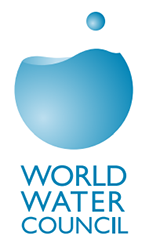 The World Water Council (WWC) is an international multi-stakeholder platform. It was established in 1996 on the initiative of renowned water specialists and international organizations, in response to an increasing concern about world water issues from the global community. The World Water Council catalyzes collective action during and in between each World Water Forum – the world's largest event on water. Organized every three years with a host country, the Forum provides a unique platform where the water community and key decision makers can collaborate and make long-term progress on global water challenges.
The World Water Council (WWC) is an international multi-stakeholder platform. It was established in 1996 on the initiative of renowned water specialists and international organizations, in response to an increasing concern about world water issues from the global community. The World Water Council catalyzes collective action during and in between each World Water Forum – the world's largest event on water. Organized every three years with a host country, the Forum provides a unique platform where the water community and key decision makers can collaborate and make long-term progress on global water challenges.
Activities in 2023
10th World Water Forum "Water for Shared Prosperity". In 2023, preparatory phase and processes for the 10th World Water Forum in Bali, scheduled for May 18 to 24, 2024, gained momentum as stakeholders convened twice: the kick-off meeting, which marked the beginning of preparations for the upcoming forum (Jakarta, Indonesia, February 15-16); the 2nd Stakeholder Consultation Meeting gathered 1,094 stakeholders from 73 countries (Bali, Indonesia, October 12–13).
Three key preparatory processes - thematic, regional, and political- were established to address various aspects of water management.
Events. In 2023, the WWC achieved a significant milestone with its support to the organization of the 2023 UN Water Conference (New York, March 22-24). The WWC actively engaged in over 15 events, advocating for key issues like local governance, basin management, and disaster response. Emphasized the political nature of water challenges, highlighting the upcoming 10th World Water Forum in Bali.
The World Water Council, Moroccan Ministry of Equipment and Water, and International Network for Basin Organizations organized the 3rd International Conference on Water and Climate with over 500 global participants (Fez, Morocco, July). It addressed water management challenges amidst climate change, while discussions emphasized the need for innovation and knowledge-sharing.
Four major events were co-organized by the WWC, including the 3rd high level seminar on water security, special sessions, and the launch of the report "Opening-Up Integrated Water Resource Management: to Include Energy, Food, Health and Education" during the XVIII World Water Congress (Beijing, China, September 11-15).
A WWC delegation actively participated in the Euro-RIOB 2023 and kick-off of the 5th Mediterranean Water Forum (Valencia, Spain, October), 6th Cairo Water Week (Cairo, Egypt, November), 9th World Water Cities Forum (Daegu, Korea, December).
New strategy. The World Water Council adopted in 2023 a comprehensive strategy aimed at aligning the Task Forces with the World Water Forum’s Thematic framework. Through this synergy, the World Water Council and the World Water Forum are better equipped to drive insightful dialogue and present concrete solutions that will contribute to building meaningful and sustainable change in the water sector. In 2023, the Board of Governors convened four times, holding two virtual sessions and two in-person meetings.
Publications. Opening-Up Integrated Water Resource Management: to include Energy, Food, Health and Education (WWC Report, June); Triennal Strategic Framework - 2023-2025
Source: The World Water Council